
Welcome to 2025!
Tomorrow, I will list the 11 SHOWDOWNS that we’re going to have this year on the site. Because I know how impatient you all are, I’ll give you a quick preview.
Our first showdown, which will happen on January 23rd, is going to be LOGLINE SHOWDOWN.
But it comes with a twist. You are not going to send in a single logline. You are going to send in FIVE loglines. I’ll decide which one is best. I will then post the 10 best loglines (from those top choices) that were submitted and all of you will vote.
Now, there’s a reason I’m doing this. We often get obsessed with a single idea. So much so that it’s impossible for us to receive criticism regarding that idea. We see it all the time in the comments. Someone posts a logline. Others don’t like it. The writer becomes fiercely defensive and everyone goes home angry.
I understand defending one’s idea. If we weren’t personally attached to what we wrote, what we wrote would probably suck.
But, the other day, I saw that one of you posted how John Hughes used to come up with hundreds of ideas a year so that he was only picking the best of the best to make movies from.
I want to use that same approach here. Instead of becoming attached to one idea that may be bad, I want you to generate multiple ideas. This will create less of an attachment and allow you to be okay with others judging them. Also, a lot of times what will happen is that a throwaway idea will end up being your best one.
This happens all the time in pitch meetings. The writer comes into the studio to pitch his slam-dunk idea. It’s immediately clear the executives aren’t into it. He pivots to another idea. They don’t like that one either. He then pitches some throwaway idea he came up with a couple of weeks ago and, bam, the execs are hooked.
So, if I were you, I would start generating five loglines A DAY leading up to January 23rd, Logline Showdown Day. Send me the top 5 of those 100 loglines. If you do that, you should have one good movie concept in there. If all this goes as planned, we’ll have the most competitive Logline Showdown ever.
And this is all part of a bigger plan. I will tell EVERYBODY who submits loglines, whether they get chosen or not, which logline was their best one. There will be a major Script Showdown announced tomorrow. I would then prefer that the entry for that showdown be your best logline.
I always say never to use flashbacks so I don’t know what it says that I’m violating my own rule.
BUT…
I did catch up on the last few movies that I missed last year and I wanted to give you my thoughts about them. Keep in mind that I saw faults in all of these movies from afar, which is why I didn’t see them when they came out. Therefore, I was predisposed to disliking them. I’ll start with the worst and move my way up to the best.
Elevation
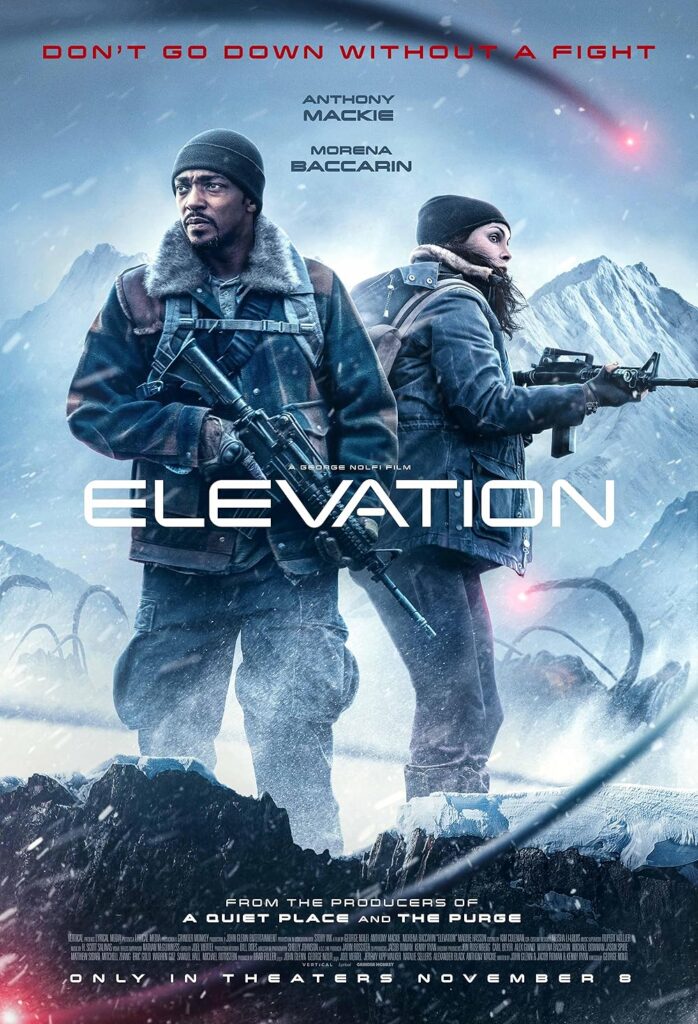
What’s interesting about this movie is that this is the type of script I tell you guys to write. In fact, there’s a good chance this logline would’ve finished high on this month’s Logline Showdown. After a worldwide invasion by mysterious monsters, humanity’s only safety is to move up to a higher elevation, where the monsters can’t survive. In this case, that’s 8000 feet.
It comes from the same producers of A Quiet Place so it has that same high concept feel to it. But this movie was no Quiet Place.
I knew it was in trouble when the main plot revealed itself. This community lives in a safety zone above 8000 feet. The main character’s son has health issues. They run out of medicine for him so they have to head to the city to get more. The city, of course, is below 8000 feet. That’s your movie.
The “go get medicine” trope is so played out that you can’t use it as a main plotline. You can use it as a subplot in, say, a TV show, which shows like The Walking Dead do all the time. But it can’t be your main plot. That’s about as lazy of a creative choice as you can come up with. You need to be more original.
But the bigger issue here is that you could tell they didn’t have enough story. There were tons of scenes with characters sitting around, sharing difficult moments from their pasts, or talking about their feelings. A good script should never feel like it’s biding time. It should feel like there isn’t enough time. When you have to write scenes to stretch your script out to an acceptable length, your script is dead in the water.
But are you ready to get mind-f*%&ed? I would still tell you to write this script. You know why? Because you’re reading a review of the movie. Which means it got made. Which means that EVEN THOUGH they had a bad script, they still made it. Why? Because it was a high concept. High concept stuff is more likely to get made, which means you don’t need to execute the script perfectly to get traction with it.
Saturday Night
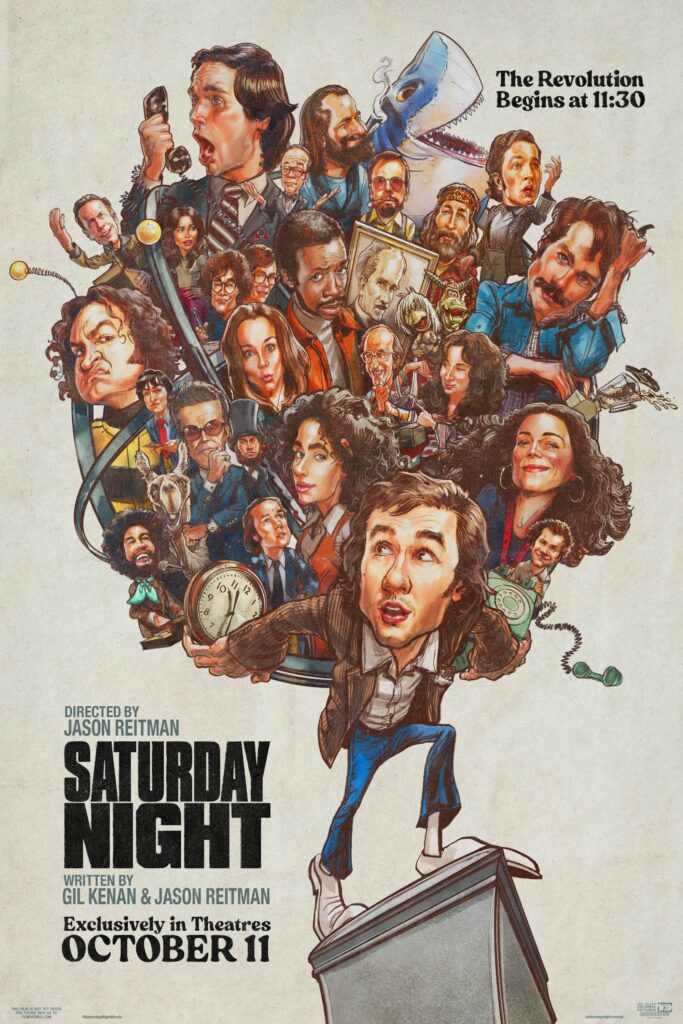
There is NOBODY who likes a real-time concept more than me. I’m of the belief that the tighter you make your timeframe, the more urgency and tension you pack into your script. You do yourself so many favors with this format cause it hides a lot of the problems that come up in a script otherwise.
Jason Reitman has me rethinking that opinion.
Saturday Night has to be one of the more frustrating movies I’ve seen in a while because, with every scene, I thought, “I *should* be liking this.” Yet I wasn’t.
You have the insane pressure of putting on a show with only minutes left to get ready and everything is going wrong. It’s complete chaos. Nobody likes each other. That’s the recipe for a tension-filled movie!
But I think I know why it didn’t work. For one, the driving force for liking this movie is understanding who’s who. It’s understanding who Dan Akroyd is. Who Chevy Chase is. Who John Belushi is.
The movie does a terrible job of conveying this. None of the actors look like their real-life counterparts. This means that older people who grew up with Saturday Night Live come away frustrated.
Then you have the younger audience watching this movie. If you don’t have any idea who these people are at all, I don’t know why you would have any interest in the film. I suppose if you made the characters fun to watch onscreen, anybody would like them, regardless of whether they’d heard of SNL or not. But neither Chevy Chase, Dan Akroyd, or John Belushi, stand out. None of them have a moment where you think, “Ooh, this character is interesting. I want to know more about them.”
But the bigger issue is that the movie decides to make Lorne Michaels (the creator of Saturday Night Live) the main character and he is the single most uninteresting character I watched in movies all year.
A good protagonist should be ACTIVE. They should be exerting themselves on the plot. This does two things. It makes us like the main character (we like people who take action) and it injects life into the plot. If the protagonist is trying to do things, he will be met with obstacles and conflict, which create drama and entertainment.
All the Lorne Michaels’ character does in this movie is stumble from scene to scene and observe what’s going on. He never does anything. He never exerts himself on the production. He does so little, in fact, that I would not have faulted a viewer for assuming he was a production assistant.
On top of this, the movie isn’t funny. I didn’t laugh once. Much of the dialogue is Sorkin’esque, the walking-and-talking million-words-a-minute style that made Aaron famous. The problem is, it’s third-rate Sorkin at best. This goes back to my complaint about The Franchise. If you’re making a comedy, you need funny people in the key positions – director, writer, actor. There were no comedians in any of those positions here. So you reap what you sow.
Nightbitch
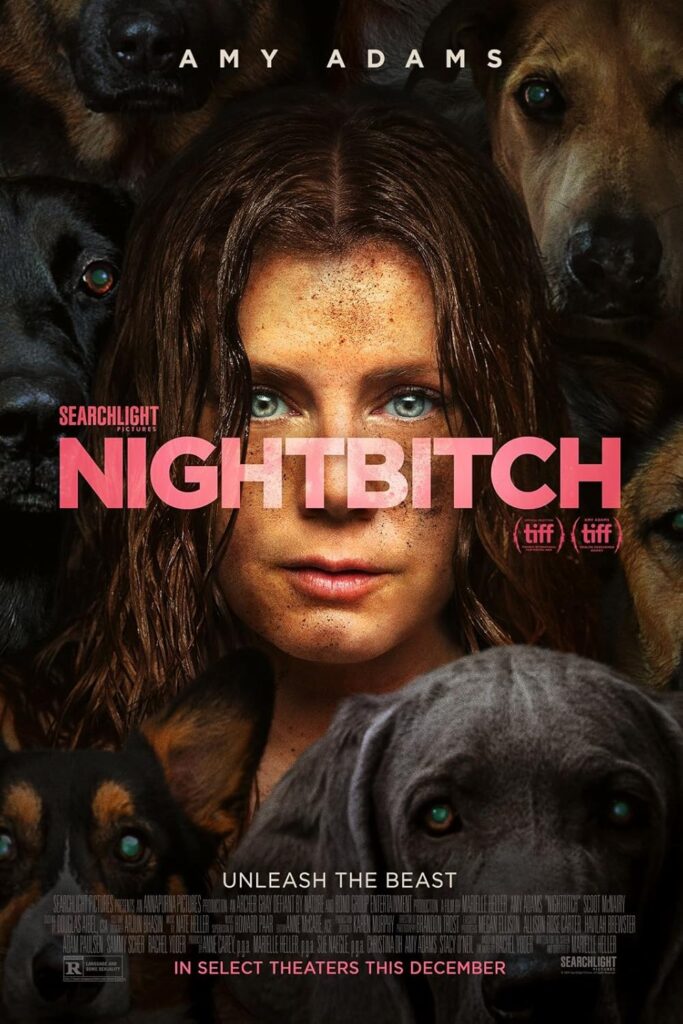
Nightbitch is one of those movies that would’ve finished top 5 on the Black List. Why? CAUSE IT’S A GIANT METAPHOR. A suburban mother who’s going insane due to her stay-at-home duties starts turning into a dog.
It’s a metaphor for… something.
The point is, scripts like this are always celebrated because intellectual types think they’re smart. They also contain an x-factor that elevates them above your typical movies that examine life.
But the script fails due to a basic problem – no plot. I see this all the time in character examinations. The writer becomes so focused on examining their main character that they forget to create a story for them to move through.
All Nightbitch does is drop us into unconnected scenes of our heroine either a) doing something with her kid, or b) doing something with her husband.
To the writer’s credit, there is a significant amount of conflict. There is conflict within our main character. And there is conflict between our main character and her husband. But you still need a plot. You still need a destination. If you don’t give the reader a destination and they, therefore, don’t know where they’re headed, it becomes very difficult for them to stay engaged.
This is Screenwriting 101. Build some GSU into your story. You may have been able to save the film.
The Order
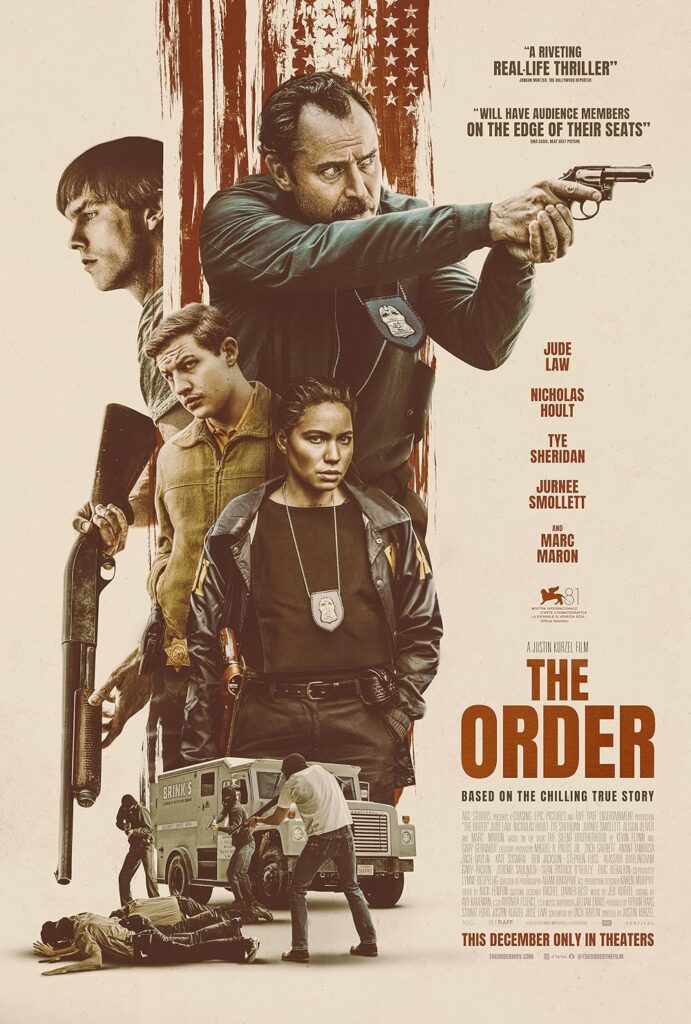
I have begun to trust IMDB ratings much more than Rotten Tomatoes ratings. Rotten Tomatoes has this movie at 91%. IMDB has it at a 6.8. In general, a 7.0 on IMDB means it’s an average movie. A 7.1 is a little better. And a 7.2 usually means it’s good. Every point higher than that means the movie is genuinely good. A 7.6, for example would equate to a genuinely awesome flick.
The Order is a 6.8 movie. It’s watchable but weak in too many key areas. It’s a confused premise. It presents as a “based on a true story” movie, set in the 70s following domestic terrorists. But it’s not true. It’s all made up. Which is strange.
Why set some fictional movie in the 70s for such a random topic? Idaho (where the movie is set) has some domestic terrorist issues NOW. So, why not set it now? It would’ve been a million times more interesting.
The seriousness with which the movie presents itself prevents any sort of excitement from unfolding. And it seems to deliberately make choices that make the movie worse as opposed to better.
For example, in an early bank robbery scene, our crew steals money from a bank and shoot off in the getaway car, celebrating their victory. Then, out of nowhere, you hear a BANG and blood splatters across everyone’s face. There’s momentary confusion as to what happened and who got shot.
But instead of telling you, the director cuts to the next scene, our bank-robbing leader arriving home with the money, covered in blood. His girlfriend says, “What happened!?” “Nothing, just an ink explosion.”
So nobody got hurt then. Oh and, also, all the money they stole was wrapped in plastic. So none of the money got hit with the ink explosion. Nobody got hurt. The ink explosion didn’t mark the money, meaning it can still be used. WHAT WAS THE POINT OF THE INK EXPLOSION THEN!!??
The movie’s shining light was its bank robbery scenes. They were the best bank robbery scenes I’ve seen in years. But there were only a few of them. Everything else about this movie plods along boringly.
Gladiator 2
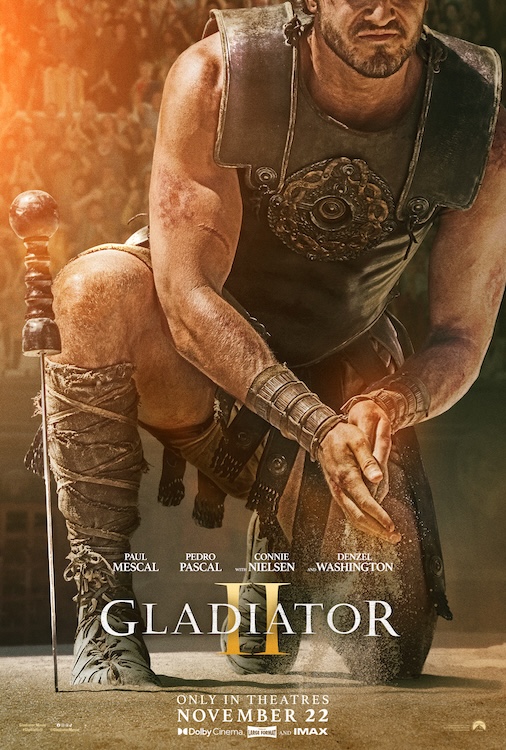
Oh, Gladiator 2. This is a tough movie to talk about because it’s so decidedly average and we don’t have a community to discuss average movies anymore. Movies either need to be great or terrible. There’s no in-between.
The biggest award I can give this film is that it takes a rather elaborate plot and manages to keep it on the tracks. There’s a lot going on here. You have these co-emperors of Rome and they defeat some country in battle and they make that country slaves and they bring them to Rome and yet one of those defeated men, our hero, used to be Roman and he falls under the tutelage of some “vice” emperor played by Denzel, who turns him into a gladiator and, oh yeah, it turns out (spoiler) that he’s actually Maximus’s secret son and then Denzel takes out the brother emperors and becomes emperor himself and now he and our gladiator are enemies.
There’s a LOT going on in this plot. It’s the opposite of Nightbitch.
Despite Denzel being the best thing about the movie, the decision to hire him ultimately hurt it. Because Denzel blows everyone out of the water in every scene that he’s in in every movie. Here, he’s pitted against an actor, Paul Mescal, who’s still raw. He doesn’t yet have gravitas onscreen. The reason the first movie worked so well was because Russell Crowe was always the biggest thing onscreen. Mescal is no Crowe. And, therefore, it’s the villain, Denzel, who comes away as the biggest character in the movie as opposed to who it should’ve been – our hero.
I still think this movie is worth checking out. I liked the unique choice to make the emperor a two-headed monster. And I liked the weirdness of those characters. And, unlike a lot of the movies listed above, Gladiator 2 never gets boring. It only fails to achieve what you want it to. And maybe that’s because our expectations were too high to begin with.
Wicked
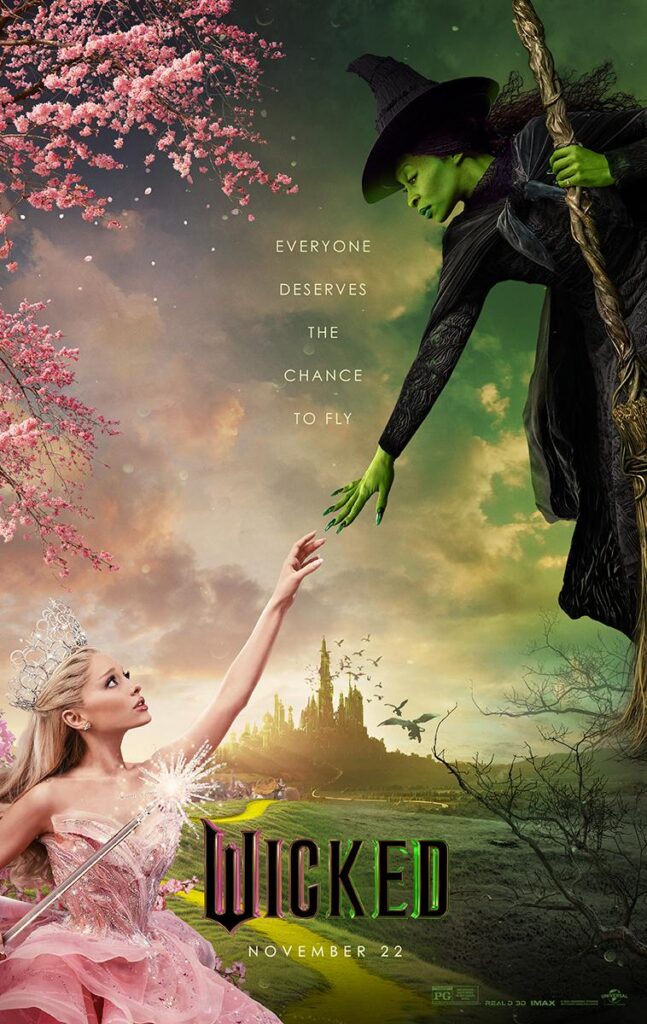
Wicked wins the “Best of the Missed Movies” list by a hair over Gladiator 2. You can always tell if a movie is “working” within the first scene. That doesn’t mean you’ll like it. But there are so many movies where the elements don’t come together in a harmonious way, leaving the movie feeling disjointed and unsure of itself.
I’m thinking of movies like The Fall Guy and If and Fly Me To The Moon and Borderlands and Megalopolis. The ingredients of these movies are all fighting against the overall product.
Not the case with Wicked. You can feel a certainty behind the film. The director, the actors, the production designers – they all knew exactly the film they were making and that confidence comes across on screen.
The actor I was most worried about was the big revelation in the film – Ariana Grande. This is because I assumed she was playing the good guy. Ariana Grande is not good! Therefore, when we learn that she actually plays the villain, everything falls into place. She is the most villainous villain of the year, both in real life and in the film. And the movie shines because of it.
The script shines the brightest by utilizing one of the most tried-and-true devices in screenwriting – a pair of characters (Glinda and Elphaba) who despise each other. Forcing two people who don’t like each other to be around one another is the dramatic gift that keeps on giving. It’s so simple yet so effective and, for me, it was what made the movie so fun. In fact, whenever the two were apart, I would eagerly wait for them to reunite. The movie was always best when they shared the screen.
That doesn’t mean there weren’t issues. The movie was way too long, an unapologetic 2 hours and 40 minutes. It certainly took its time through some sections. But I thought the movie was good overall.
Did you see any of these movies? Or did you catch up on any 2024 films that surprised you? If so, share your thoughts below! And if you want to start pitching loglines for community feedback, go for it!

